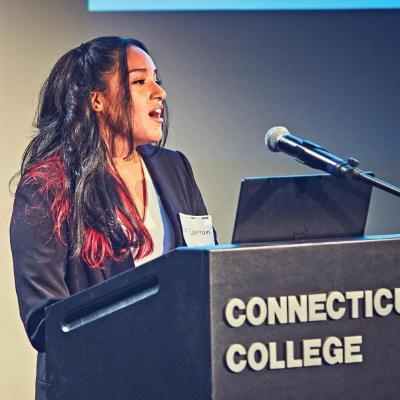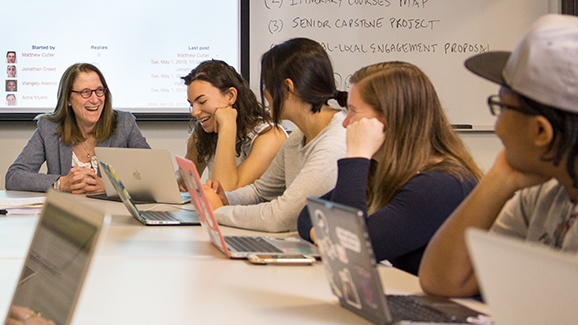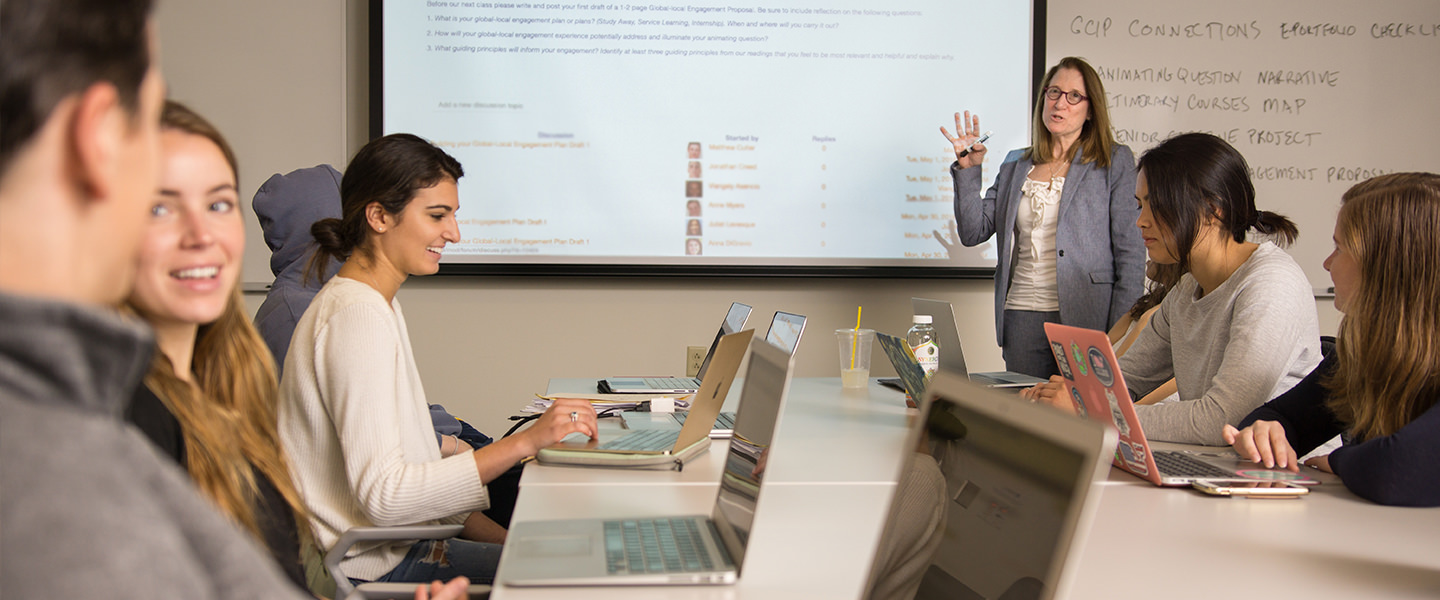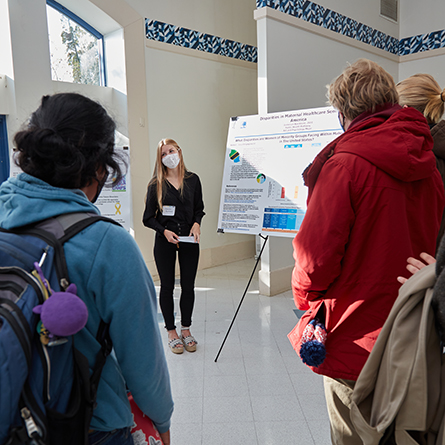
Pathways
Integrative Pathways, a cornerstone of Connections, help prepare students for a meaningful life after Conn.
Erin O’Brien Powers ’20 has always been interested in medicine. But the behavioral neuroscience major, who hopes to pursue a career in healthcare, had never really considered the impact of food access on health until she enrolled in Connecticut College’s new Public Health Pathway.
“People often associate health and medicine solely with doctors and hospitals, but there are so many different factors that determine health outcomes,” she said. For example, “Our health and what we eat are directly related. But many people who live in poverty don’t have access to healthy food, or, if they do, they can’t afford it.”
O’Brien Powers is a member of the inaugural class of Connecticut College students taking part in Connections, the College’s reinvention of the liberal arts for the 21st century.
A cornerstone of Connections is the Integrative Pathway, a set of courses and experiences organized around a central theme. Modeled after the College’s innovative centers for interdisciplinary scholarship, Pathways allow students to explore issues they are passionate about by intentionally combining their academic major with interdisciplinary study and off-campus learning through study away and a relevant internship. The Pathway culminates in an all-College symposium where students present the results of their integrative studies to the larger campus community.
The College officially launched Connections with the arrival of the Class of 2020. As first-year students, they participated in specially designed introductory courses called first-year seminars, supported by a team of advisers who helped them identify their interests and create personalized education plans. Now sophomores, nearly 200 members of the class have enrolled in one of nine available Pathways or in one of the four center certificate programs.
“With the introduction of Pathways, we have expanded the groundbreaking educational model of our centers to a wider group of students, putting the College once again at the forefront of integrative education for the liberal arts,” said Dean of the College Jefferson Singer.

“In the first year, more than 40 percent of sophomores have elected to be part of a Pathway or a center, setting us well on the path to providing this type of education for every student.”
Students are enrolled in all nine Pathways, including Bodies/ Embodiment; Cities and Schools; Entrepreneurship, Social Innovation, Value and Change; Eye of the Mind: Interrogating the Liberal Arts; Global Capitalism; Peace and Conflict; Power/ Knowledge; Public Health; and Social Justice and Sustainability. Three more Pathways—Creativity; Migration, Displacement and (Im)mobilities; and Data Analytics—are in various stages of development.
Juliet Wilson ’20, a sociology major and an art history minor who hopes to pursue a career in fashion advertising, enrolled in the Bodies/Embodiment Pathway to explore her interest in the way certain body types, sizes, races and genders are portrayed in the media. She says the gateway course for the Pathway, which she is taking this spring, has been her favorite class at the College.
“One week we are dancing Capoeira to explore our body’s movement and perception in a given space, and the next we are learning costume history and the implication clothing has on our bodies,” she said.
Associate Professor of Sociology Afshan Jafar, who co-coordinates the Bodies/Embodiment Pathway, compares the traditional general education “checklist” of courses to puzzle pieces that don’t fit together. With Connections, she says, students are still gathering pieces from different areas, “but those pieces are going to fit, and you are going to put this puzzle together.
“Being exposed to different perspectives and being able to find the common thread between them is an important skill. No matter what profession they choose, our graduates will be able to synthesize all kinds of information and make the connections that lead to solutions,” Jafar said.
Each Pathway was designed to complement any major and help students connect their passions and interests with internship and career opportunities, Singer said.
“The Pathways are powerful vehicles for students to see the applications of what they are learning in the classroom.”
Ted Kasper ’19, a government major, hopes to pursue a career in healthcare administration. His Public Health Pathway gateway course recently had the opportunity to meet with Dr. Michael Wagner ’81, president and CEO of Tufts Medical Center, to learn about his work and get his perspective on the social inequities of health care.
“So far in the course we have looked at everything from food deserts in New London to abandoned buildings in Detroit. I’m excited to apply my background in political science to the problems and injustices we are facing in today’s society,” he said. “By learning about these problems in the classroom, I will be better prepared to face them in the workforce and beyond.”
Biology Professor Martha Grossel, who coordinates the Public Health Pathway, said the goal is to help students expand their perspectives and understand the cultural, racial and economic influences in the world.
“It’s about understanding the world they live in differently. To me, that is what is so exciting—they understand things now that they didn’t just a few months ago, and they will build on that foundation for the next few years.”
Noel Garrett, dean of academic support and director of the Academic Resource Center who coordinates the Entrepreneurship, Social Innovation, Value and Change Pathway, said he has received great feedback from students enrolled in the Pathways.
“They have provided productive, thoughtful and meaningful feedback that will help us continue to move these existing Pathways to new places, and will provide valuable input for the creation of new ones.”
As a member of the first group of students to embark on the Pathway experience, Kenneth Colombe ’20 considers himself to be an academic trailblazer of sorts. Colombe, who plans to double major in economics and statistics, is enrolled in the Entrepreneurship Pathway.
“We are brought up [to believe] that business is all about the bottom line and turning profits. I’m excited to explore how incorporating our duty to be socially conscious makes businesses more or less viable,” he said.
“Connections is the culmination of the liberal arts—you get to weave together different classes, passions and points of view. It’s cool to know that our experience will help shape future Conn students’ curriculum for the better.”
Wilson, who plans to study and intern in New York City at the intersection of fashion, art and media, agrees.
“Knowing that I would have the opportunity to complete core curriculum classes all centered around my interests was definitely a factor in my decision to attend Connecticut College.”

